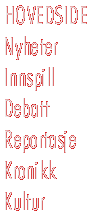
|
|
Redaktør: Teknisk ansvarlig:
|
|
Spørsmål angående
engelsk kan stilles til språkrådgiver Stewart Clark,
Studieavdelingen, e-post: stewart.clark@adm.ntnu.no,
Split infinitives Which of these sounds most like an airport announcement? * «Passengers are requested to always keep their baggage and personal belongings with them». * «Passengers are requested always to keep their baggage and personal belongings with them». * «Passengers are requested to keep always their baggage and personal belongings with them». If you opt for the first one, this is a split infinitive. Split infinitives mean the insertion of a
word/words between the infinitive marker and the verb stem, such
as between «to» and «keep», as in «to
always keep». Traditionally, purists have termed this one
of the deadly sins in English. As many modern authoritative books
about English such as the New Oxford Dictionary of English
point out, this «rule» is probably misguided. First,
because natural idiomatic English uses «to really enjoy
a beer» with a split infinitive. I am not convinced by alternatives
that avoid the split infinitive such as «to enjoy really
a beer» or «really to enjoy a beer». Second,
the purists' love for avoiding the split infinitive is said to
originate from practice in Latin. This has always been a strange
argument when Latin infinitives are One advantage of splitting the infinitive is the greater precision of putting the emphasis in the correct place. Consider, «His only wish was to really sleep» (meaning sleep very well and undisturbed). If we wrote, «His only wish really was to sleep» (this means just to sleep, and there is nothing about the quality of sleep). A second advantage is the natural English argument. «I wish to flatly forbid» sounds more natural than «I wish to forbid flatly» or «I wish flatly to forbid». Always, finally, fully, nearly, really and simply are typical adverbs that naturally split infinitives today. On the other hand, a lengthy gap between «to» and the following infinitive is not recommended and «He wanted to completely and comprehensively redesign the training programme», should be rephrased. In conclusion, splitting infinitives is a natural part of modern English and there is nothing wrong in writing «to always use», «to really remember» or like the e-mail offer that came last year «to boldly go where no search engine has gone before». Tricky words Arab, Arabia, Arabic Arab (Norw. arabisk) means a member of the
Semitic Arabia (Norw. Arabia) means the geographic area between the Red Sea and the Persian Gulf. This is also called the Arabian peninsula. Put the stress on the second syllable «ray». Arabic (Norw. arabisk) refers to the language and literature of the Arabs. Also, when non-capitalized, arabic means a numbering system: «Write this in arabic numerals (1, 2, 3, 4...)». Asian, Asiatic Asian (Norw. asiatisk). In Britain, Asian means a person from the Indian subcontinent. Elsewhere, the term Asian means a person who is a native or inhabitant of the continent of Asia. This is the term to use for people or their culture. Asiatic (Norw. asiatisk) can beused to refer to geographical features in Asia: «Asiatic plains». Asiatic is also a technical term in some scientific and technical contexts. However, this term should not be used to refer to people as it is racially offensive. Use Asian or the nationality instead when referring to people from Asia. arts, humanities, liberal arts Arts (Norw. filosofiske fag) means subjects in literature, language, philosophy, history etc. as opposed to science and technology. Humanities (Norw. humaniora) is a term that was originally restricted to classical studies in Latin and Greek. The humanities is now used more broadly to mean all arts subjects. Liberal arts (Norw. allmenndannelse) is a term that sometimes has wider scope than the arts or humanities. In AE, where the term is frequently used, liberal arts courses comprise «the arts, humanities, natural sciences, and social sciences», Random House Webster's College Dictionary, 1991. Enlightening English The Guardian reported the recent change of government in Norway under the headline: «Green pledge topples Norwegian government». A day later, Dagbladet with its sense for page-three type stories referred to this as «Green pledge topless Norwegian government». The minibar witch is in your room... (hotel notice, northern Norway) «Ladies and gentlemen, welcome to this technical mess» (Opening address at an international high-tech trade fair in Sweden) |

 Stewart's
Corner
Stewart's
Corner